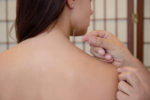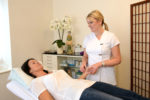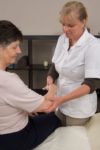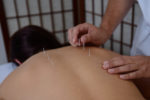
Acupuncture
Millions of people around the world use acupuncture for specific health issues and general wellbeing. Although it is still not widely accepted by the traditionalists within mainstream medicine, positive evidence in its favour is beginning to accumulate. Many people with arthritis are seeking additional ways of managing their symptoms alongside conventional medicine. Is acupuncture one to consider?
 What is acupuncture?
What is acupuncture?
Acupuncture involves inserting very thin needles through the skin at specific points on the body at varying depths. It sounds painful but it isn’t. Practiced in China for thousands of years, its popularity has spread rapidly into the western world over the last couple of decades.
Is it suitable for people with osteoarthritis?
“Arthritis is actually one of the most common reasons that people visit an acupuncturist,” explains Mark Bovey of the British Acupuncture Council. “Of four million acupuncture treatments per year, around 10% are for osteoarthritis.”
A review published by Arthritis Research UK (2013) found consistent evidence to suggest that acupuncture is effective for treating both osteoarthritis and lower back pain. And there is some consistency of evidence when it comes to fibromyalgia.
Is it suitable for people with rheumatoid arthritis?
Whilst the report from Arthritis Research UK found there is little evidence to show people with rheumatoid arthritis benefit from acupuncture, it does highlight that acupuncture has a high safety profile. Booking in with a recommended highly qualified acupuncturist could therefore be worth a try.
 Which symptoms of arthritis can acupuncture help?
Which symptoms of arthritis can acupuncture help?
“In clinical trials the most common measurements are for pain, ability to carry out daily activities and quality of life,” Mark outlines. “Acupuncture has been found to help with each of these. According to the largest review so far (involving 18,000 people), we would expect about 50% of acupuncture patients to get a substantial reduction (at least 50%) in pain, compared with only 30% of those on usual GP care who have no acupuncture. There is no other non-drug treatment that is likely to be more effective.
“Patients and practitioners may see changes in other symptoms too, both physical and mental, though there’s little research on this. In one large trial of acupuncture vs counselling for depression, the people who did particularly well with acupuncture were those who also had chronic physical pain, so it does have the potential to treat the whole person, whatever their health situation, in one go.”
How does it actually work?
There are two main explanations of how acupuncture works but they are not mutually exclusive; practitioners will take both into account when considering their treatment approach.
Chinese medicine viewpoint
All ill health is considered to indicate a breakdown in the smooth flow of the body’s qi, or vital energy. In osteoarthritis the qi would stagnate particularly in the affected joints. This would inevitably be accompanied by impaired blood circulation, so that the joint tissues would be insufficiently moistened and nourished. Acupuncture would be applied to appropriate points locally, distally and systemically to try to re-establish a healthy flow and clear the stagnation.
Different people’s manifestation of the disease vary, for example: hot and inflamed joints vs cold joints; arthritis where the pain moves from place to place vs arthritis where it is fixed; dull aching vs strong stabbing pain. Each person is diagnosed and treated according to their particular symptoms and their characteristics as a whole.
Biomedical viewpoint
In general, acupuncture is believed to stimulate the nervous system, influencing the production of the body’s communication substances: hormones and neurotransmitters. The resulting biochemical changes activate the body’s self-regulating homeostatic systems, stimulating its natural healing abilities and promoting physical and emotional wellbeing.
Some of the many mechanisms through which acupuncture treatment may act in people with arthritis include:
• Stimulating nerves located in muscles and other tissues, which leads to release of endorphins and other biochemical factors and changes the processing of pain in the brain and spinal cord;
• Promoting the release of substances that inhibit inflammation;
• Increasing local microcirculation, which aids dispersal of swelling.
 How to choose an acupuncturist?
How to choose an acupuncturist?
One of the reasons why acupuncture is not considered a mainstream treatment is that it is not tightly regulated – anyone can call themselves an acupuncturist.
As acupuncturists have different levels of training, some achieve better results than others. However, three core organisations ensure their members have trained to a good level, so make sure the acupuncturist you are considering is a member of one of them:
1) The British Acupuncture Council;
2) The British Medical Acupuncture Council;
3) The Acupuncture Association of Chartered Physiotherapists.
What to expect
“Before your first acupuncture session there are several things you should bear in mind,” Mark suggests. “Many commonly used acupuncture points are located on the lower arms and legs, so it is helpful to wear clothing that allows easy access to these areas. Try not to go for treatment on an empty stomach or straight after a heavy meal. And let your practitioner know if you are completely new to acupuncture so they can take extra time to explain what happens and ensure you are comfortable with the process.”
Your first consultation
During your first visit the acupuncturist needs to gain a thorough understanding of your main complaint and general health and lifestyle. This involves asking questions about your current symptoms and medical history, sleeping patterns, appetite and digestion, and emotional wellbeing. Women are asked about their menstrual cycle, past pregnancies and childbirth.
You might feel that some questions appear unrelated to your condition but the information you give helps the practitioner form a more complete picture of your health and lifestyle. The acupuncturist will take your pulse on both wrists, examine your tongue and feel for areas of muscular tension or pain.
Your main health complaint
When talking about your main complaint, the practitioner might ask you to describe in your own words what the symptoms feel like and how severe they are. You may be asked how long you have been having the symptoms, whether they are constant or intermittent and how frequent they are. Do mention any medication you are taking and whether you have tried any other therapies.
 The treatment
The treatment
Based on the information you have given, the practitioner will make a diagnosis and put together a treatment plan, which may include lifestyle and dietary advice as well as acupuncture. Your practitioner will use very fine single-use pre-sterilised needles to stimulate specific acupuncture points on your body. Because energy meridians range across the whole body, the points used are not necessarily close to where you experience pain or discomfort. For example, if you suffer from headaches needles might be inserted in your foot or hand.
After-effects
“Most people find acupuncture relaxing and often feel very calm after a treatment,” Mark says. “You may feel a little tired and should take this into account if you are planning to drive or use heavy machinery straight after your treatment.
“Refrain from vigorous exercise after treatment and, ideally, give yourself a little time to rest. It is advisable not to drink alcohol for several hours after treatment.
“Acupuncture has very few side effects and any that do occur are usually mild and self-correcting.”
How much does it usually cost?
Most acupuncturists are self-employed so there is no standard rate. Some will give concessions as appropriate. Expect to pay £50–£70 for the first session, which usually comprises the initial consultation and the first treatment, and £40–£60 per session thereafter.
The bottom line
Acupuncture is not a cure for arthritis or any other health condition. But the evidence is stacking up in its favour as a way of reducing symptoms of osteoarthritis, back pain and fibromyalgia. Fewer studies have been done when it comes to inflammatory forms of arthritis, but as it is deemed to be relatively safe, it is certainly an opportunity for those looking for options to try in addition to their current treatment.
Further information
• The British Acupuncture Council, visit www.acupuncture.org.uk or tel 020 8735 0400
• The British Medical Acupuncture Society, visit www.medical-acupuncture.co.uk or tel 01606 786782
• Acupuncture Association of Chartered Physiotherapists, visit www.aacp.org.uk or tel 01733 390007
Fancy a trip? Click here for a round-up of relaxing breaks that offer acupuncture…
